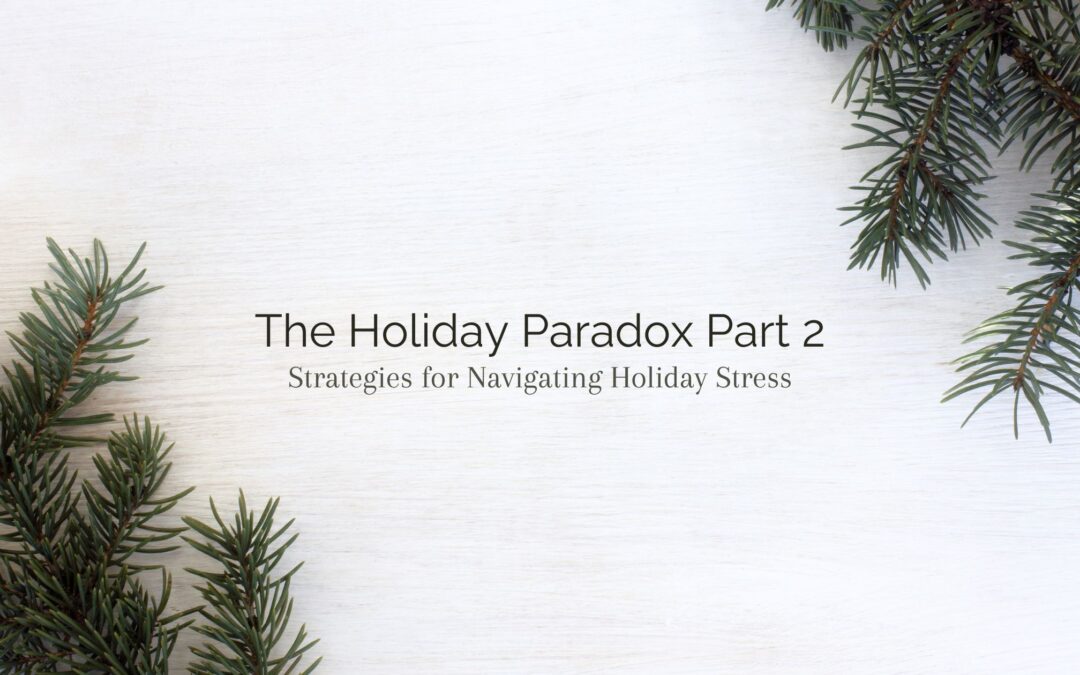One of the most effective ways to appropriately manage holiday stress is through clear communication and setting boundaries. This can be challenging, especially when dealing with family members who may not understand or respect your needs. Here are three fundamental strategies that can help empower you when navigating the holidays:
Proactive Preparation: Before attending family gatherings, reflect on your needs and limits. Ask yourself what you can realistically handle and what might be too much.
- Clear Communication: Express your needs and boundaries to your family members in a calm and assertive manner. It’s important to be direct yet respectful. For example, you might say, “I value our time together, but I need to leave by 8 PM to ensure I’m well-rested for work.”
- Seek Support: Ask for help. If you anticipate a particularly challenging situation, enlist the support of a trusted family member or friend who can be there to help you navigate the situation. Remember, asking for help when you’re feeling overwhelmed is okay. Reaching out to a therapist, confiding in a friend, or even finding a support group can provide you with the tools and perspective you need to manage holiday stress. Just as a ship caught in a storm seeks the guidance of a lighthouse, seeking help during turbulent times can provide you with a sense of direction and safety.
Therapy’s Role in Enhancing Communication and Boundary-Setting During the Holidays
Therapy can play a pivotal role in helping individuals navigate the complexities of family interactions during the holiday season. The therapeutic setting offers a safe and supportive space where clients can explore and develop effective strategies for communicating their needs and setting healthy boundaries. Here’s how therapy can assist in this vital process:
- Identifying Personal Needs and Boundaries: Self-awareness is the first step in effective communication and boundary-setting. Therapy helps clients delve into their own feelings, needs, and limits. Through guided exploration, clients can uncover what truly matters to them and what boundaries are necessary for their well-being. In therapy sessions, we can work towards mapping out your own emotional landscape, allowing you to mark out areas where you need to assert yourself or prioritize.
- Developing Assertiveness Skills: People pleasing, keeping the peace, and engaging in familiar interaction patterns are all easy cycles to fall into when we are stressed from the holidays. Therapy provides a platform to practice assertiveness in a non-threatening environment. This involves learning how to express thoughts and feelings clearly and respectfully, without aggression or passivity. When clients role-play various family scenarios in session, they are better equipped with strategies to handle difficult conversations and feel more able with the feedback offered in session, just like rehearsing for a play, where each session builds confidence and skill in delivering one’s lines with conviction.
Understanding Family Dynamics: A therapist can help clients dissect and understand the intricate dynamics of their family relationships. This insight can be empowering, enabling clients to anticipate potential triggers and plan their responses. By understanding the roles they and their family members have historically played, clients can strategize ways to break old patterns. Clients can then decode a relationship’s complex dance, where understanding each step helps choose a different rhythm or foster a new dance that can help break away from negative interaction cycles.
- Strengthening Emotional Regulation: Holidays can evoke strong emotions. Therapy can equip clients with tools to manage their emotional responses effectively. Techniques such as mindfulness, deep breathing, and cognitive reframing can help clients maintain composure during stressful interactions. Learning when your emotional or sensory window of tolerance is crucial to ensure the holidays don’t overwhelm you.
- Creating a Support Plan: Therapy can assist clients in developing a support plan for the holiday season. This may include identifying allies within the family, setting up check-ins with a therapist or friends, and planning self-care activities. Knowing you have a support plan is a nice safety net, ensuring that you feel supported and less alone this holiday season.
- Navigating Guilt and Obligation: Feelings of guilt and obligation often prevent effective boundary-setting. Therapy can help clients work through these emotions, understand their origins, and find healthier ways to cope. It’s about replacing the burden of guilt with a sense of empowerment and self-respect.
In essence, therapy serves as a crucial ally in preparing clients for the emotional complexities of the holiday season. By fostering self-awareness, assertiveness, understanding of family dynamics, emotional regulation, and a strong support system, therapy empowers clients to approach family interactions with confidence, clarity, and a sense of control. This preparation enhances their holiday experience and contributes to their overall emotional growth and well-being.

As we wrap up our exploration of navigating holiday stress, remember. While you can’t control your quirky Aunt Edna’s unsolicited advice or your cousin’s endless parade of dad jokes, you can manage your reactions and set boundaries. So, as you venture into this festive season, armed with new insights and strategies, let’s all aim for less stress and more holiday cheer – after all, the only thing we want to be stuffed with this season is the holiday food, not our emotions!
If you missed part 1, here is the link.
Photo credits:
Photo by Greg Rakozy on Unsplash
Photo by Kelly Sikkema on Unsplash
Photo by Chandler Cruttenden on Unsplash


 Proactive Preparation
Proactive Preparation Understanding Family Dynamics
Understanding Family Dynamics